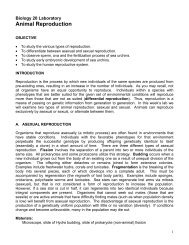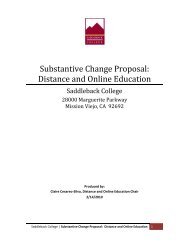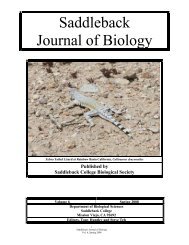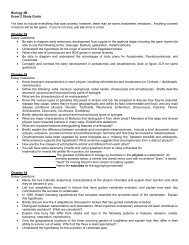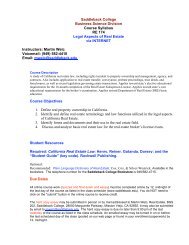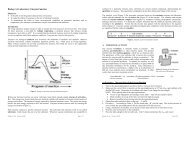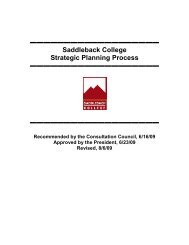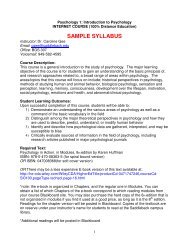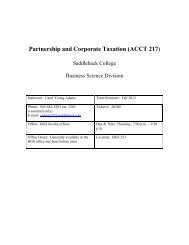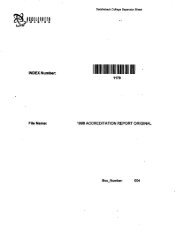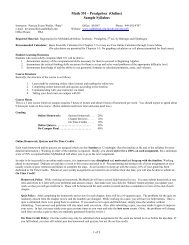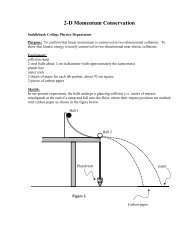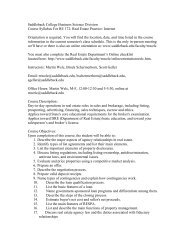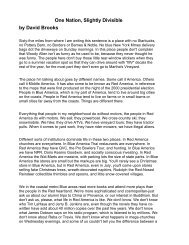Saddleback Journal of Biology - Saddleback College
Saddleback Journal of Biology - Saddleback College
Saddleback Journal of Biology - Saddleback College
Create successful ePaper yourself
Turn your PDF publications into a flip-book with our unique Google optimized e-Paper software.
Fall 2009 <strong>Biology</strong> 3B Paper<br />
(European Community for Coal and Steel: Guidelines<br />
for Spirometry, 1973)," Westernhagen, et al. (1978).<br />
Many studies have shown large differences<br />
between the lung function <strong>of</strong> swimmers verses nonswimmers,<br />
such as Mickleborough, et al., (2008). This<br />
concept <strong>of</strong> increased lung function via training could<br />
be applied to patients with pulmonary issues as a<br />
successful, drug-free treatment option. In this study,<br />
the forced vital capacity <strong>of</strong> thirty males was measured<br />
and analyzed based on their experience in activities<br />
which require highly controlled voluntary breathing.<br />
Materials and Methods<br />
Thirty individuals that met the agreed upon<br />
requirements were selected; the specific standards were<br />
set to decrease potential statistical errors. All<br />
participants were between the ages <strong>of</strong> sixteen and<br />
twenty-six. A specific age range was determined to<br />
exclude age as a contributing factor. Researchers<br />
selected ten marching band wind instrumentalist, ten<br />
varsity water polo players, and ten members for the<br />
control group. Prior to testing, all subjects were asked<br />
for their height, weight, years <strong>of</strong> experience, and<br />
age. Every instrumentalist and polo player had between<br />
three and nine years <strong>of</strong> experience. Members <strong>of</strong> the<br />
control group were individuals who did not play wind<br />
instruments or partake in any cardiovascular exercise<br />
more than once a week. Experienced wind musicians<br />
and swimmers were defined as highly trained players<br />
who practice a minimum <strong>of</strong> eight hours a week.<br />
Trumpet players and water polo players were selected<br />
for this experiment due to their need for highly<br />
controlled voluntary breathing.<br />
The trumpet players were all subsequently<br />
enrolled in the Aliso Niguel High School marching<br />
band. The data were collected during their usual<br />
rehearsal at Aliso Niguel High School, in Aliso Viejo,<br />
California. Measurements were taken after thirty<br />
minutes <strong>of</strong> non-stop marching and playing, because<br />
researchers preferred to measure active forced vital<br />
capacity as opposed to resting forced vital capacity<br />
(FVC).<br />
Dana Point’s Dana Hills High School water<br />
polo varsity players participated in this experiment.<br />
Following the thirty minutes <strong>of</strong> warm-up, which<br />
consisted <strong>of</strong> non-stop laps in the pool, data were<br />
collected using a spirometer to measure active<br />
maximum breath, or FVC. The partakers were told to<br />
take a deep breath and blow into the spirometer has<br />
hard and as long as possible.<br />
Results<br />
Mean <strong>of</strong> each groups are 4375cm 3 for the water<br />
players, 4225cm 3 for the instrumentalist, and 3220cm 3<br />
for the control. Significant difference was found in<br />
FVC between the control group and the two others<br />
using ANOVA single factor test. To find where the<br />
difference lie we run a Bonferroni test, it showed that<br />
there was significant difference between the control<br />
group and the water polo players and a difference with<br />
the control group and the musicians. There is no<br />
significant difference in FVC between the water polo<br />
players and musicians; there was a P value <strong>of</strong> 0.23.<br />
Differences were considered significant at<br />
P



